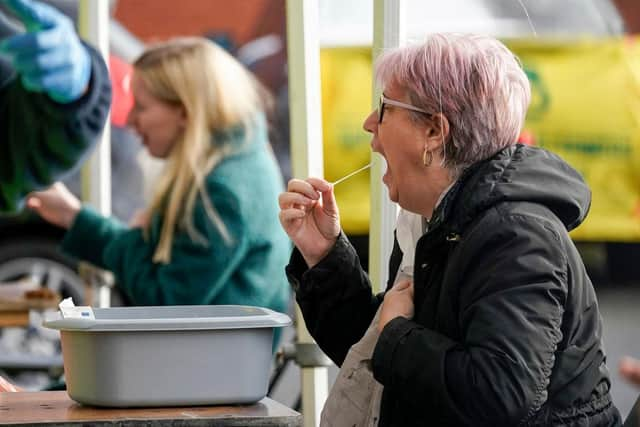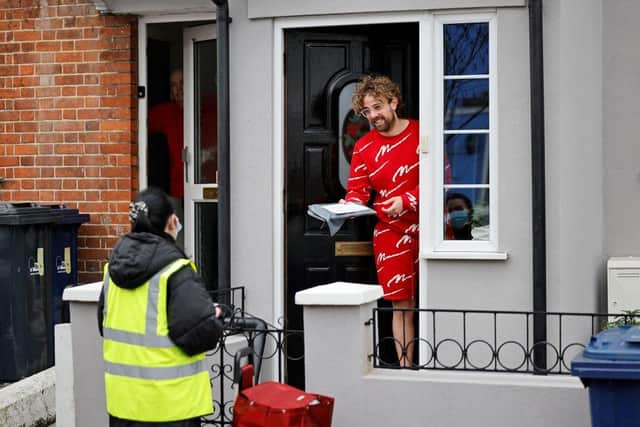Surge testing: what is it, which areas of the UK are being mass tested, and how are results collected?
The Department of Health and Social Care (DHSC) has announced that more areas of England will see a rollout of “surge testing” programmes, after cases of the South African variant of Covid-19 were found there.
The variant is believed to be more transmissible than the original strain of the virus, and uncertainty around its effect on the efficacy of existing vaccines still persists.
Here is everything you need to know about it.


Where is surge testing taking place?
Advertisement
Hide AdAdvertisement
Hide AdThe DHSC has announced testing regimes will be set up in Norfolk, Southampton and Woking, Surrey, where positive cases of South African variant have been discovered.
The testing will be targeted within the postcodes of IP22, SO15 and GU22 in those areas respectively.


Additional surge testing and genomic sequencing is being deployed to the TS7 postcode in Middlesbrough, areas in Walsall and in specific areas in the RG26 postcode in Hampshire where the variant has been found.
The operation in parts of Walsall has been extended in response to a confirmed second case of the variant which is not believed to be linked to international travel.
Advertisement
Hide AdAdvertisement
Hide AdEfforts in Manchester to track down examples of the mutation of the more transmissible Kent variant will also be expanded following deployment of testing teams last week, with the postcode districts of M40 and M9 set to be targeted.
What is surge testing?
People living within the targeted testing areas are strongly encouraged to take a Covid-19 test this week, whether they are showing symptoms or not, a spokesperson for the department said.
In many of the affected areas, testing kits will be delivered to people’s doorsteps and collected by a team of volunteers, who will not need to enter the household.
Check with your local authority for the latest information.
People with symptoms should book a test in the “usual way”, and those without symptoms should visit their local authority website for more information, they added.
Advertisement
Hide AdAdvertisement
Hide AdDHSC said surge testing in parts of the London boroughs of Haringey and Merton, along with Sefton in Merseyside, were complete.
Why is surge testing important?
Surge testing is seen as a vital component in the Government's plan of easing the country out of its third national lockdown, and the DHSC has not denied suggestions that rapid-result testing – which can provide results in less than 30 minutes – will be at the heart of attempting to introduce a level of normality in the coming months.
When asked about a potential programme of mass testing, Foreign Secretary Dominic Raab told Sky News: “We learnt previously in places like Liverpool and other areas in the north, the value, particularly when you have got a spike, of testing done at scale and at pace, particularly with the new lateral flow testing.”
Raab said that the vaccine rollout, treatments for coronavirus and carrying out lateral flow testing “at scale, at pace” would be “important” when easing the lockdown.
Advertisement
Hide AdAdvertisement
Hide AdOn lateral flow testing, he added: “It’s only one part of the strategic jigsaw, if you like, but make sure we can come down on it like a tonne of bricks.
Will surge testing be introduced nationwide?
The Times said NHS Test and Trace is preparing for nationwide “surge” testing under which more than 400,000 lateral flow tests will be sent by post to homes and workplaces every day under a scheme called: “Are you ready? Get testing. Go”.
The Foreign Secretary described the plans as “ambitious”, and told Times Radio Breakfast, “we are absolutely doing everything we can to meet those targets.”
“They are obviously designed to be challenging, because we want to get people out of the current lockdown as soon as possible. The only way to do that is responsibly, safely – that’s the way we make it sustainable.”
Advertisement
Hide AdAdvertisement
Hide AdThe Times said there would be mass testing before some schools reopen next month, and it is believed the plans to extend asymptomatic testing will formally be announced by the Prime Minister when he reveals his "roadmap" out of lockdown next week (22 February).